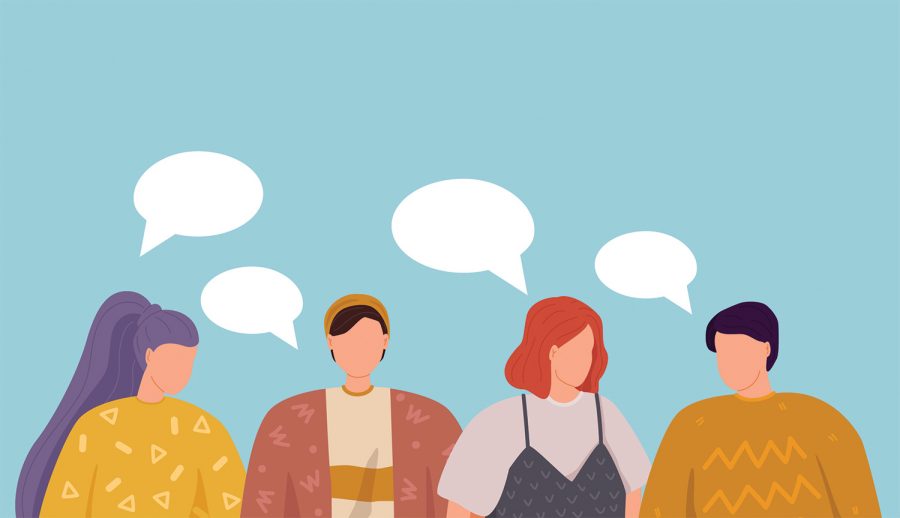Opinion | It’s time to find alternatives to ableist language
Although ableist rhetoric has been normalized in our society, it is important we educate ourselves and expand our vocabulary away from using harmful ableist language.
Studio
Vector illustration, flat style, Group of people discuss social media news, social networks, chat, dialogue speech bubbles
September 2, 2020
Ableist rhetoric is deeply rooted in our society and easy to come by in everyday life. Carelessly throwing around ableist language perpetuates harmful stereotypes associated with the disabled community, strips people of their value as humans, and undermines real health conditions people live with.
According to Access Living, “ableism is discrimination of and social prejudice against people with disabilities based on the belief that typical abilities are superior.” When we use ableist language we are creating negative connotations with the disabled community, in turn perpetuating ableism.
It is rare a day goes by where I don’t hear someone offensively using language associated with the disabled community out of context. For example, habitually I hear people using “autistic” as an adjective to describe some less-than-desirable situation. If someone can’t hear something, often I hear them refer to themselves as “deaf.” Some use “albino” to describe someone who feels like they are too pale. When a situation is out of hand, people might use words such as “crazy” or “insane” as descriptors.
When we use this type of language we are devaluing and dehumanizing a group of people.
Because of how normalized it is, many times the intention behind the ableist language people use daily is not malicious, however, there are plenty of alternatives to these words that are more precise and accurate representations of what people might be trying to describe.
According to a blog done by Lydia X.C. Brown, a writer focused on advocating for disability rights, instead of using words like crazy and insane as descriptors try using words like wild or out of control. Instead of using words like lunatic or maniac, you can use words such as fearless or reckless. We should all be expanding our vocabulary, moving away from harmful ableist language.
Because ableism has become so normalized and overlooked in our society it is easy to slip up and use ableist language in our everyday speaking and writing even while consciously trying to be more aware. All the more, it is incredibly important to consistently be checking ourselves and those around us, as well as acknowledging why the language we use can be so harmful.
As said by Maysoon Zayid, a comedian, writer, and actress, in a Refinery 29 article, it may seem trivial because words such as stupid and crazy can be used as positive descriptors — however, they are still insensitive word choices because they downplay real heath issues people live with.
As stated in a blog done by Lydia X.C. Brown, it is important to recognize that many of the words that are offensively used outside of the disabled community may be reclaimed within the disabled community — much in the same way that LGBTQ communities have actively reclaimed the term “queer.” Additionally, many people have different preferences on how they would like to identify. Regardless, it is our job to make sure we are being aware of the language we use and the impact it has on the disabled community.
There are many resources and glossaries of commonly used ableist language and words that could be put in their place. Making the conscious effort to de-stigmatize disabilities through eliminating ableist language from our vocabulary could be the first step to many in helping tear down systemic issues the disabled community faces daily.
Columns reflect the opinions of the authors and are not necessarily those of the Editorial Board, The Daily Iowan, or other organizations in which the author may be involved.
















